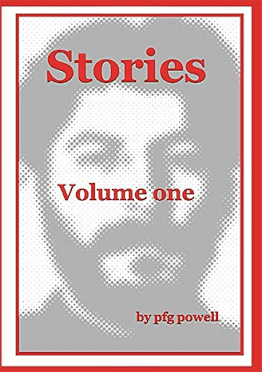I’ve got loads more to post on the site, but it all needs to be read again and re-written as I do repeat myself a lot, and much of that repetition is not very relevant to the particular topic of the ‘essay’. Suggestions of any kind are very welcome, though that’s a tad forlorn request as such request are always ignored. Why I can’t think. Timeand again I’ve plugged, plugged, plugged the only novel I have written so far (and don’t be out off by the cover, left, — that’s part of it and it isn’t quite as straightforward as it might seem) and a book of short stories (below left) but has anyone bothered to buy a copy (and all you pay is the production cost, for Lord’s sake)? Have they hell.
As it happens I’m not at all put out because at my late age (it was my birthday yesterday, and I’ll not see 30 again) I expected nothing more form people. As someone once pointed out ‘the great thing about being terminally cynical is that you are never disappointed’.
But I do want to get this Hemingway bollocks out of the way, simply because I want to get on with something else and it hangs over me to such and extent that if I spend part of the day not reading or writing about the old fraud, I feel vaguely guilty, the sort of guilt you feel when you take a sickie and just can’t enjoy the buckshee time off. Well, I couldn’t anyway.
What else is new? The covid stuff is getting a little long in the tooth, about time we had a new crisis. This one has outstayed its welcome, and the public are remarkably fickle about such matters. Sad to say ourcrises are like fashion: they go out of date very quickly. Remember Aids and how we ‘were all going to die’ (that memorable headline in the then Daily Mirror which cleverly did not claim we would all ‘die of Aids’, and so was on to a winner — we are all going to die.
As for covid, it’s really getting impossible to know what to believe. My view is that it is better to be safe than sorry, but that doesn’t necessarily mean the doomsters are all correct in their assessment. Then there’s the mystery about why some groups are more at risk than others: black and Asians (who make up a substantial proportion of our British national health service staff are said to be particularly at risk. Young children on the other hand — are told — are not. Also very confusing is just how much at risk of dying we are if we contract it, why some people who have the virus are asymptomatic, and on and on.
I have been amusing myself arguing the toss with various state-registered idiots in the Daily Telegraph comments section, the vast majority of whom are convinced ‘it’s all a hoax’ and a plot to ‘rob us of our freedoms’. When asked directly just why a government — pretty much all governments around the world — seem to be so keen of ‘robbing us of our freedoms’ answers come none. One idiot I was ‘debating with’ — I was debating, he was slagging me off — insisted it is all just a scam for politicians to ‘make money’. It doesn’t help on that score that, at least here in Britain, public funds have been badly spent on personal protective equipment (PPE).
But anyway, time for the rugby or football. I can’t make up my mind whether to watch France hammer the Scots in the ‘Autumn Nations Cup’ (on now, France already 3-0 up) or watch Leicester and Liverpool try to get the better of each other. Decisions, decisions . . .
Now take a quick look at the Hemingway site and tell me whether it is shite or shite.





